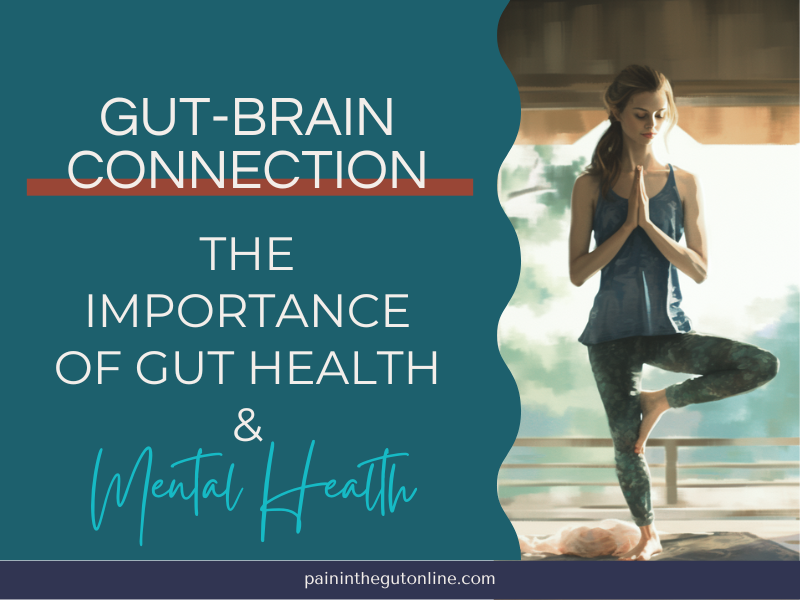GUT HEALTH AND MENTAL HEALTH
7 min. read
Nurture your gut, nourish your mind! Discover the importance of gut health and mental health with the gut-brain connection.

Table of Contents
Gut Health and Mental Health Connection
When it comes to your well-being, gut health plays a significant role in influencing your mental health. The connection between your gut and brain, known as the gut-brain axis, is a complex and fascinating system that has a profound impact on your overall mental well-being.
Understanding the Gut-Brain Axis
The gut-brain axis refers to the bidirectional communication pathway between your gut and brain.
It involves a complex network of nerves, hormones, and biochemical signaling that allows the two systems to communicate with each other.
The vagus nerve, which connects the brain and the gut, plays a crucial role in this communication. It carries information from the gut to the brain and vice versa, allowing for constant feedback and interaction. This connection highlights the intricate link between your digestive system and your brain.
The Impact of Gut Health on Mental Health
Research has shown a strong correlation between gut health and mental health. When your gut is healthy, it is home to a diverse community of beneficial gut microbiota. These microorganisms help maintain a balanced and harmonious environment in your gut.
However, when the balance of these microorganisms is disrupted, it can lead to an imbalance in your gut microbiome, a condition known as dysbiosis.
Dysbiosis has been associated with various mental health conditions, including anxiety, depression, and mood disorders.
The exact mechanisms behind this connection are still being studied. It is believed that the gut microbiota influences the production of certain neurotransmitters, such as serotonin, which play a role in regulating mood and emotions.
Chronic digestive issues, such as irritable bowel syndrome (IBS), inflammatory bowel disease (IBD), and gastroesophageal reflux disease (GERD), are often accompanied by mental health symptoms.
This indicates a bidirectional relationship between digestive issues and mental health, where one can exacerbate the other.
Taking care of your gut health plays a vital role in maintaining optimal mental well-being.
By adopting a gut-healthy lifestyle, including a balanced diet, regular exercise, and stress management techniques, you can support a healthy gut microbiome and promote better mental health.
To learn more about how to improve your gut health and its impact on your mental well-being, explore our articles on gut health supplements, the benefits of gut health and probiotics, and the role of diet in gut health.
Remember, nurturing your gut is not only beneficial for your digestive system but also for nourishing your mind.
Gut Health and Common Digestive Issues
For individuals over the age of 40, chronic digestive issues can become a significant concern.
These issues can range from occasional discomfort to more persistent problems that impact daily life. Understanding the link between gut health and mental health is crucial for finding relief and improving overall well-being.
Chronic Digestive Issues in People over 40
As we age, our digestive system undergoes changes that can lead to the development of chronic digestive issues. Some of the common conditions include acid reflux, irritable bowel syndrome (IBS), constipation, and diverticulosis.
These conditions can cause discomfort, pain, and disruption to daily activities.
To address these chronic digestive issues, it’s essential to consult with a healthcare professional who can provide an accurate diagnosis and recommend appropriate treatment options. They may suggest lifestyle modifications, dietary changes, medication, or other interventions to manage the symptoms effectively.
The Link between Digestive Issues and Mental Health
It’s important to recognize the strong connection between gut health and mental health.
Research has shown that individuals with chronic digestive issues are more likely to experience symptoms of anxiety, depression, and stress. The gut and the brain communicate through the gut-brain axis, a bidirectional pathway that influences both physical and mental well-being.
The gut is home to trillions of bacteria, collectively known as the gut microbiome. These bacteria play a crucial role in digestion, nutrient absorption, immune function, and even the production of neurotransmitters that regulate mood and emotions.
When the balance of the gut microbiome is disrupted due to chronic digestive issues, it can have a negative impact on mental health.
By addressing and improving gut health, it is possible to alleviate some of the mental health symptoms associated with chronic digestive issues.
This can be achieved through various strategies, including diet and nutrition, gut-friendly foods and supplements, and stress management.
For more information on a gut-health diet and foods to improve gut health, check out our articles on gut health diet and foods to improve gut health.
It’s important to remember that everyone’s journey to better gut health is unique. Consulting with a healthcare professional or a registered dietitian can provide personalized guidance and support in managing chronic digestive issues and promoting overall health and well-being.
Additionally, certain supplements and probiotics may be recommended to support gut health. Learn more about gut health supplements and gut health and probiotics for more information.
Improving Gut Health for Better Mental Health
Taking steps to improve your gut health significantly affects your mental well-being.
By making conscious choices about your diet and nutrition, incorporating gut-friendly foods and supplements, and managing stress effectively, you can nurture your gut and nourish your mind.
Diet and Nutrition
A healthy diet plays a crucial role in maintaining a balanced gut microbiome, which in turn impacts your mental health.
Focus on incorporating fiber-rich foods such as fruits, vegetables, whole grains, and legumes into your diet. These foods promote the growth of beneficial gut bacteria and help maintain a healthy digestive system.
Including fermented foods like yogurt, sauerkraut, and kimchi can introduce beneficial probiotics into your gut. Probiotics help maintain a healthy balance of bacteria in your gut and have been linked to improved mental health. Check out our article on gut health and probiotics for more information.
Gut-Friendly Foods and Supplements
Certain foods and supplements can support gut health and improve your mental well-being. For example, omega-3 fatty acids found in fatty fish, flaxseeds, and chia seeds have anti-inflammatory properties that can benefit both your gut and brain.
Including these foods in your diet can help reduce inflammation and promote a healthy gut environment.
You may consider incorporating gut health supplements into your routine as well. These supplements can provide targeted support for your gut microbiome. However, see your healthcare provider before starting any new supplements.
Our article on gut health supplements can provide further insights.
Stress Management and Gut Health
Stress can negatively impact your gut health and, in turn, affect your mental well-being.
Finding effective stress management techniques is crucial for nurturing your gut and nourishing your mind. Engaging in meditation, yoga, or deep breathing exercises can help reduce stress levels and promote a healthy gut-brain connection.
Prioritizing self-care and incorporating relaxation techniques into your daily routine can have a positive impact on both your gut health and mental health.
Focusing on your diet and nutrition, including gut-friendly foods and supplements, and practicing effective stress management techniques can improve your gut health and support your mental well-being.
Remember, small changes can make a big difference over time. For more information on foods that can improve gut health, take a look at our article on foods to improve gut health.
Lifestyle Changes for a Healthy Gut and Mind
When nurturing your gut and nourishing your mind, make targeted lifestyle changes that have the most impact.
Incorporating these changes into your daily routine, you can support a healthy gut and promote overall mental well-being.
Let’s explore three key lifestyle changes that can benefit your gut and mind: regular exercise, adequate sleep, and balancing gut microbiome.
Regular Exercise and Gut Health
Engaging in regular exercise not only benefits your physical health but also plays a significant role in maintaining a healthy gut.
Exercise helps to stimulate the muscles in your digestive system, promoting better digestion and preventing common digestive issues. Physical activity can help reduce stress, which is closely linked to gut health.
By managing stress levels through exercise, you can support a healthier gut and improve your overall mental well-being.
Adequate Sleep and Gut Health
Getting enough sleep is vital for your gut health and mental health, as well as your overall health.
Sleep deprivation can disrupt the balance of gut bacteria and increase inflammation, leading to digestive issues and even affecting your mental health.
Aim for 7-8 hours of uninterrupted sleep each night to provide your body with the rest it needs to maintain a healthy gut and support optimal mental well-being.
Balancing Gut Microbiome for Mental Well-being
The gut microbiome, the collection of microorganisms in the digestive tract, plays a crucial role in both gut health and mental health.
To promote a balanced gut microbiome, focus on consuming gut-friendly foods rich in fiber, such as fruits, vegetables, whole grains, and legumes. These foods support the growth of beneficial bacteria in the gut.
Incorporating probiotics into your diet, either through fermented foods or gut health supplements, can also help maintain a healthy balance of gut bacteria. For more information on probiotics and their impact on gut health, check out our article on gut health and probiotics.
By making these lifestyle changes, you can nurture your gut and nourish your mind. Regular exercise, adequate sleep, and a balanced gut microbiome contribute to a healthier gut and promote mental well-being.
Remember, small steps towards a healthier lifestyle can make a significant difference in your overall health. For more tips on improving gut health through diet, explore our article on a gut health diet.
Note: It’s important to consult with a healthcare professional before making any significant changes to your exercise routine or sleep patterns, especially if you have underlying health conditions.
If you’re ready to make a change in your life and want to learn even more about gut health and how you can start improving yours today, consider joining our email list!
Our newsletter is the best way to get up-to-date information, tips, and gut-friendly recipes delivered straight to your inbox every week. As our way of saying thank you for subscribing, you’ll receive a FREE copy of our Beginner’s Guide to Gut Health!
This guide includes:
- Why is gut health important?
- Reasons why you should care about your gut health
- 60 Gut-Friendly Anti-Inflammatory Foods List
- Next Steps with a chance to save 20% in our store







